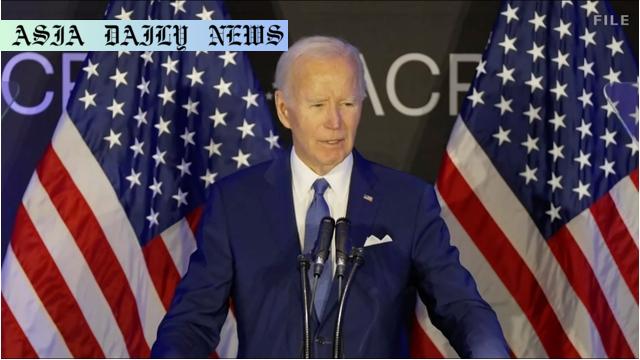Biden’s cancer diagnosis: US President Donald Trump questions timing as Biden and family consider treatment options.
Biden has been diagnosed with hormone-sensitive prostate cancer, which has spread to his bones.
Trump issued a public statement wishing Biden a swift and successful recovery.
Trump questions timing, expressing surprise that the diagnosis was not disclosed earlier.

Biden’s Prostate Cancer Diagnosis: An Overview
Former US President Joe Biden’s recent diagnosis of hormone-sensitive prostate cancer has generated significant media attention. According to reports from Sunday, his cancer has progressed to his bones, a development that, while serious, remains manageable due to its hormone-sensitive nature. Biden and his family are in consultation with medical experts to determine the best course of treatment. Despite the gravity of the disease, this type of cancer can often be controlled effectively with proper interventions.
Trump’s Reaction to the Diagnosis
US President Donald Trump expressed his concerns about the timing of Biden’s announcement during a press interaction on Monday. Trump remarked on his surprise that the illness had not been made public earlier, considering the extended time it typically takes for cancer to spread to the bones. He shared sentiments of sadness regarding the diagnosis, while extending well wishes to Biden and his family. Previously, on social media, Trump posted a message expressing support, stating that he and Melania Trump were praying for Biden’s recovery.
Biden’s Message of Resilience
Meanwhile, Joe Biden took to social media to address his health situation. Posting a photo with his wife Jill Biden, he conveyed a message of strength and resilience. “Like so many of you, Jill and I have learned that we are strongest in the broken places,” Biden wrote, emphasizing determination and solidarity in tough times. Biden’s positive tone serves as a source of inspiration to many, reflecting his ability to face adversity with courage.
Public Discourse and Implications
The announcement of Biden’s cancer diagnosis has also sparked conversations around transparency and public health. Trump’s comments about the timing highlight the complexities surrounding the disclosure of health-related information by public officials. While leaders are often expected to provide timely updates about their health, moments like these also underscore the importance of privacy and respect. This incident raises broader questions regarding how political figures navigate personal hardships while in the public eye.
Managing Hormone-Sensitive Prostate Cancer
Hormone-sensitive prostate cancer, which Biden has been diagnosed with, is a condition that can often be controlled with hormonal therapy and other treatments tailored to the stage of progression. Patients with this type of cancer typically have access to various treatment options, including medication, radiation, and potentially surgery. The survival rates for hormone-sensitive cases remain optimistic, and medical advancements continue to provide improved solutions. Support from loved ones and the broader community plays a vital role in the psychological and physical journey of battling cancer.
A Message of Hope
Despite the challenges ahead, Biden’s proactive approach to exploring treatment options reflects his commitment to fighting the disease. His message of resilience not only resonates with those battling similar health conditions but also serves as a reminder of the human experience behind public leadership. During such times, expressions of solidarity and unity should take precedence over political differences, as seen in the support extended by Trump.
Commentary
The Weight of Personal Challenges in Public Life
Joe Biden’s recent cancer diagnosis brings to light the intersection of personal health struggles and public service. As a high-profile leader, Biden serves as a reminder that no position or title exempts a person from life’s inherent adversities. His courage in addressing such a sensitive topic publicly sets an example of transparency and strength, qualities that are often essential in leadership but challenging to showcase when navigating personal trials.
Trump’s Response: A Mixed Message?
Donald Trump’s responses to Biden’s news have been notably multifaceted. On one hand, his social media message offering prayers and well-wishes reflected a rare tone of solidarity. On the other hand, his subsequent questioning of the timing of the announcement seemingly introduced an element of suspicion. While his comments were framed as observations, they highlight the ongoing complexities of political dynamics, even amid deeply personal circumstances.
The Broader Implications
Biden’s situation raises compelling questions about how leaders balance the responsibility of maintaining public trust with the right to private battles. A diagnosis like this undoubtedly reminds us of our shared humanity, yet the public’s expectations of constant transparency can often be at odds with an individual’s need for space and privacy. Political figures, while accustomed to scrutiny, face magnified pressures when their personal lives intersect with their professional responsibilities.
Final Thoughts: Empathy Over Division
In moments like these, it is crucial to approach situations with empathy rather than division. Biden’s message of resilience and unity should inspire us to look beyond differences, offering support where it is needed most. Similarly, acknowledgment of Trump’s initial expression of goodwill could pave the way for a more cooperative and understanding discourse. Personal crises, whether faced by public figures or everyday individuals, are universal experiences that deserve compassion and dignity.


